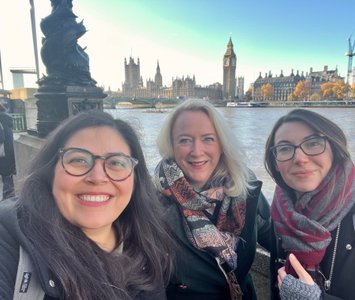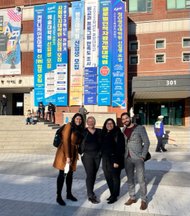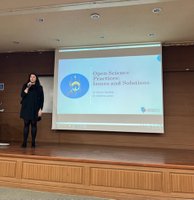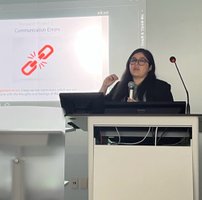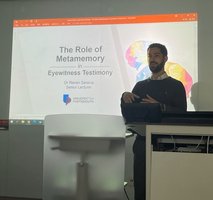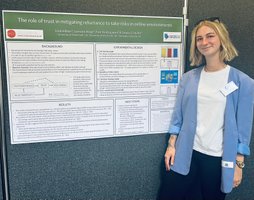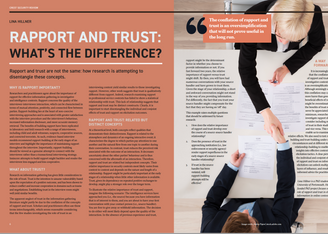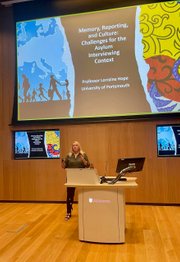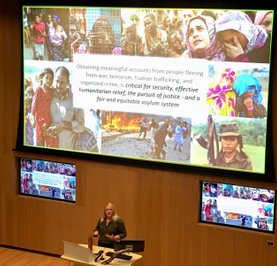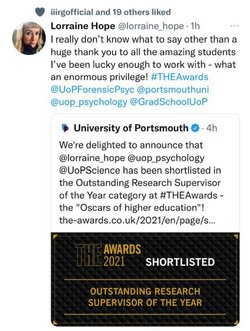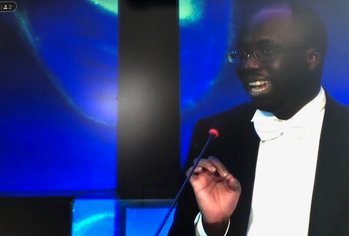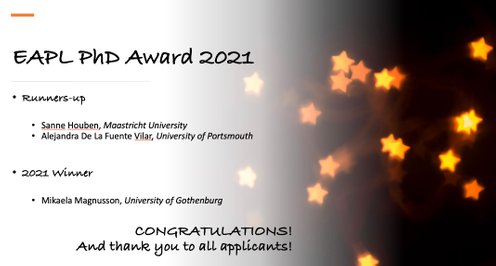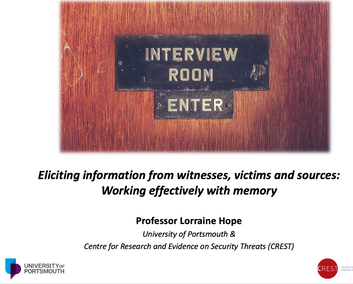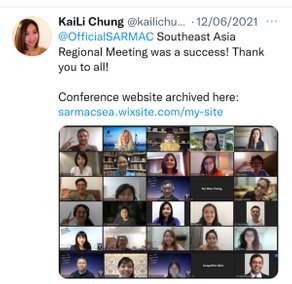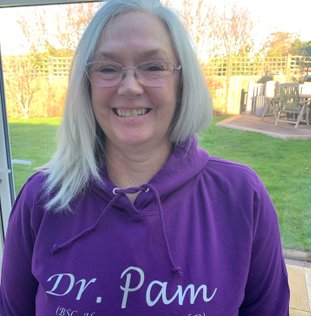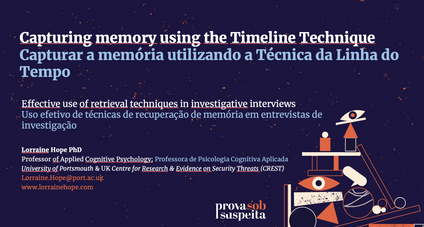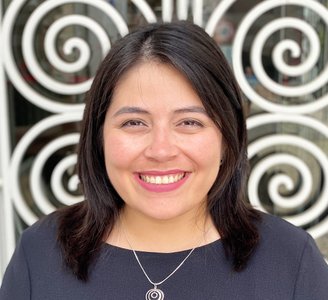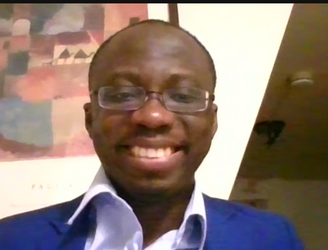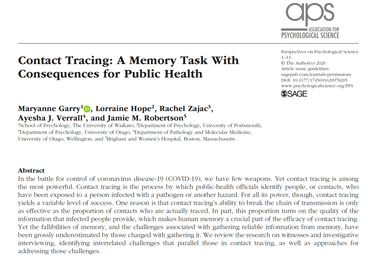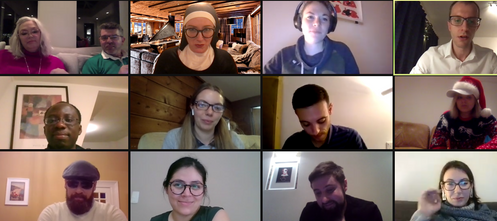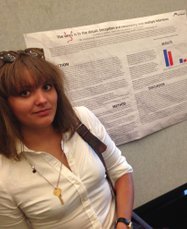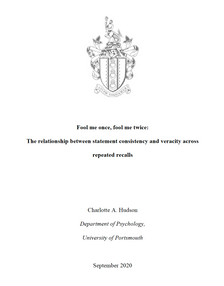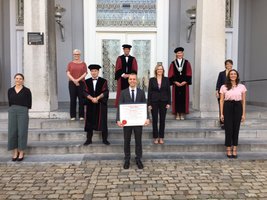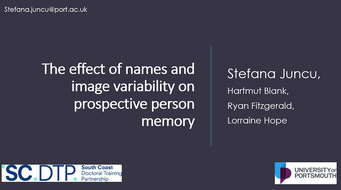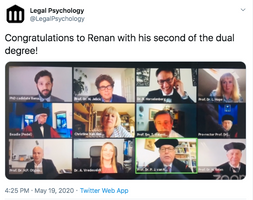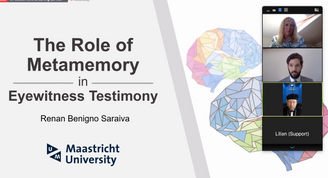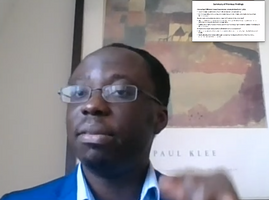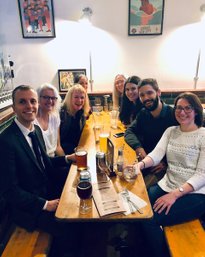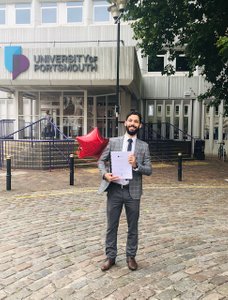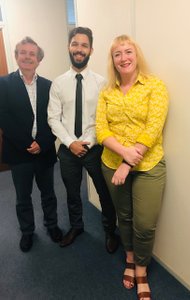HAC LAB NEWS
Spring 2023
We are conducting some exciting research online this Spring
If you're interested in taking part or learning more about what's involved, please follow this link to sign up: shorturl.at/cpvwy
or email: alejandra.de-la-fuente@port.ac.uk
CREST Round Table Series
Autumn 2022
During Autumn 2022, we delivered two CREST Round Tables in which we discussed new findings emerging from two large projects with stakeholders.
The first round table event focused on our Time Critical Questioning project in which we developed and tested a rapport-based protocol for obtaining key infomation quickly. In the second event, we presented findings from our Online Elicitation programme of work in which we examine the efficacy of rapport-building techniques in online interviews and interactions.
Both projects will pave the way for some exciting new lines of work - and we are currently writing up our findings for wider dissemination.
UK-South Korea Eyewitness Network
Research Visit to Seoul - November 2022
In November, members of HAC Lab joined colleagues from the University of Birmingham on a research visit to CAU University in Seoul for the first in-person meeting of the UK-South Korea Eyewitness Network. This trip involved seminar and conference presentations and knowledge exchange with Korean researchers, students and practitioners in the police, prison and prosecution service.
This network is funded by the ESRC and comprises researchers from the UK and South Korea, working together to improve the quality and accuracy of police lineups and witness interviewing techniques.
You can read more about the network and get involved in activities here:
https://www.ukskeyewitnessmemorynetwork.com/
This trip was a huge success - thanks to the amazing hospitality of our wonderful hosts and the commitment of everyone to the importance of high quality applied research and working together with practitioners to ensure our work addresses real world challenges.
Appointments update: Summer 2022
Congratulations to HAC member, Dr Stefana Juncu, who was appointed as a Lecturer in the Department of Psychology at the University of Portsmouth in Summer 2022.
Stef's work focus on prospective memory applied in the context of Missing Persons and eyewitness identification.
You can track down her research here: https://orcid.org/0000-0002-0479-283X
Congratulations Stef!
Behavioural and Social Sciences in Security (BASS) Conference - Summer 2022
Several members of the HAC lab presented at BASS22, including CREST PhD student, Lina Hillner, who presented the first empirical results from her PhD in a poster titled ‘The role of trust in mitigating reluctance to take risks in online environments’.
This topic is of great interest to both researchers and end-users, particularly as the concept of trust is often entangled (and indeed confused) with rapport in interviewing contexts. During Summer 2022, Lina also published a commenry in CREST Security Review exploring what we know about trust and rapport.
You can read her article here: https://crestresearch.ac.uk/comment/rapport-and-trust-whats-the-difference/
iIIRG Conference - Summer 2022
Invited Symposium on Interviewing and Culture
Memory, Reporting and Culture - Challenges for the Asylum Interviewing Context
Abstrct: The delivery of justice and other outcomes, including fair and just decisions in asylum cases, often relies on productive interactions between interviewees and interviewers from diverse cultural backgrounds. To date, the role of cultural context has largely been ignored by researchers in the field of investigative interviewing, despite repeated requests from practitioners and policymakers for evidence-based guidance for the conduct of interviews with people from different cultures. This presentation will explore what we know about cultural differences in human memory and communication and consider specific contextual challenges for investigative interviewing through the lens of culture. In particular, discussion will explore the role of culture in different investigative interviewing practices (e.g., rapport building, questioning techniques) and common areas of cultural mismatch between interviewer–interviewee expectations. Routes for collaboration, integration, and future research will be discussed.
Thank you to all contributors!
September 2021
First mini-lab night out for ages to welcome Lina Hilner.
Lina will be starting a CREST PhD examining trust and rapport in online information elicitation and identifying some innovative ways to examine these factors.
Welcome to Portsmouth, Lina!
September 2021
THE Awards 2021 Nomination
Enormously honoured and excited to have been nominated for the THE Awards 2021 in the "Outstanding Research Supervisor" category! The fact is I have been incredibly fortunate to work with so many absolutely outstanding students!
It was also a big surprise - I had no idea I had been nominated. Huge thanks to the team who put forward the nomination and other colleagues at the University of Portsmouth who supported it!
Thank you all!
More information here: https://the-awards.co.uk/2021/en/page/home-awards
September 2021
On 21 September, Nkansah Anakwah, successfully dedended his PhD (for a second time!) - this time at a public defense at Maastricht University, thereby satisfying the requirements for his Dual Award PhD within the House of Legal Psychology [Maastricht University & University of Portsmouth.
Great to see this defense going ahead (partially) in person.
Congratulations Nkansah!
August 2021
Congratulations to HAC lab member Alejandra De La Fuente Vilar who was a runner up in the first EAPL PhD Award in August 2021.
Congratulations too to Sanne Houben (Maastricht University) and the 2021 Winner, Mikaela Magnusson (University of Gothenburg)!
June 2021
SARMAC Southsea Asia Regional Meeting
Lorraine Hope delivered a Keynote titled "Eliciting information from witnesses, victims and sources: Working effectively with memory" and then a workshop on Investigative Interviewing with Fiona Gabbert.
The SARMAC Southeast Asia Regional Meeting brought together academics, practitioners, and students in the Southeast Asia region with shared interests in applied cognitive psychology.The regional meeting was due to take place in Kuala Lumpur, Malaysia, in June 2020, but due to the COVID-19 pandemic, this two day event took place virtually in June 2021.
Big thanks to the organizing committee for organising and hosting a great event!
Read more here: https://sarmacsea.wixsite.com/my-site
May 2021
In May, HAC member Carey Marr successfully defended her PhD conducted at the Universities of Portsmouth and Maastricht within the The House of Legal Psychology.
Her PhD is titled "Examining the Effects of Acute Stress on Memory in Eyewitness Settings"
Congratulations Carey! And good luck in your new post in Sydney, Australia
February 2021
A PhD for Pam!
In February, HAC member Pamela Hanway successfully defended her PhD conducted at the University of Portsmouth and funded by the South Coast Doctoral Training Partnership.
Her PhD is titled “The Effects of Cognitive Load for Investigative Interviewers”.
Congratulations Pam!
May 2021
In May 2021, Lorraine Hope presented a lecture session on Memory and the Timeline Technique as part of a training course program "Prova sob Suspeita: um olhar crítico sobre as provas dependentes da memória” (“Proof Under Suspicion: A Critical Approach To Memory Evidence”), organized by the Instituto de Defesa do Direito de Defesa – IDDD (“Institute of Defense of the Right to Defense”), in partnership with Associação Nacional de Defensoras e Defensores Públicos do Brasil – ANADEP (“National Association of Public Defenders of Brazil”) and Escola Nacional das Defensoras e Defensores Públicos do Brasil – ENADEP (National School of Public Defenders of Brazil).
JANUARY 2021
Welcome to our new CREST Postdoctoral Researcher!
Welcome to Dr Ale de la Fuente Vilar who has been appointed as the CREST postdoctoral researcher working on our new Online Elicitation programme. Delighted to have you on the team, Ale!
You can read more about this funded project here: tinyurl.com/17s072xi
Read more about the Centre for Research and Evidence on Security Threats here: https://crestresearch.ac.uk/
JANUARY 2021
On 22 January, HAC member Nkansah Anakwah successfully defended his PhD conducted at the Universities of Portsmouth and Maastricht within the The House of Legal Psychology.
His PhD is titled “Beyond WEIRD witnesses: Eyewitness memory reports in cross-cultural contexts”.
Congratulations Nkansah!
DECEMBER 2020
New paper published applying what we know about memory to contact tracing during the COVID-19 pandemic:
Garry, M., Hope, L., Zajac, R., Verrall, A. J., & Robertson, J. M. (2020). Contact Tracing: A Memory Task With Consequences for Public Health. Perspectives on Psychological Science. https://doi.org/10.1177/1745691620978205
In the battle for control of coronavirus disease-19 (COVID-19), we have few weapons. Yet contact tracing is among the most powerful. Contact tracing is the process by which public-health officials identify people, or contacts, who have been exposed to a person infected with a pathogen or another hazard. For all its power, though, contact tracing yields a variable level of success. One reason is that contact tracing’s ability to break the chain of transmission is only as effective as the proportion of contacts who are actually traced. In part, this proportion turns on the quality of the information that infected people provide, which makes human memory a crucial part of the efficacy of contact tracing. Yet the fallibilities of memory, and the challenges associated with gathering reliable information from memory, have been grossly underestimated by those charged with gathering it. We review the research on witnesses and investigative interviewing, identifying interrelated challenges that parallel those in contact tracing, as well as approaches for addressing those challenges.
FESTIVE SEASON 2020
After a long and challenging year, HAC Lab celebrated with a virtual murder mystery! With lots of laughs and some atrocious acting (yes, you Sister Holly Lewya), we used our finely honed investigsative psychology skills to identify the cunning and duplicitious perpetrator in our midst!
Roll on getting together in 3D in 2021!
NOVEMBER 2020
On 20 November 2020, HAC Lab member Char Hudson successfully defended her PhD thesis titled "Fool me once, fool me twice: The relationship between statement consistency and veracity across repeated recall".
Congratulation, Char!
OCTOBER 2020
On 14 October, HAC-member Alejandra de la Fuente Vilar successfully defended her PhD conducted at the Universities of Maastricht and Gothenburg and completed her Joint Doctoral Degree at The House of Legal Psychology. Her PhD work focused on investigative interviews with uncooperative witnesses, examining interviewing strategies used to overcome resistance and gain witness cooperation as well as how lack of cooperation affect information disclosure and witness memory.
Congratulations Ale!
SEPTEMBER 2020
On 18 Septmeber, Sergii Yaremenko completed his (socially distanced) public defense at Maastricht University and thereby completed the requirements for a Dual Doctorate from The House of Legal Psychology.
Congratulations again, Sergii!
JUNE 2020
On 11th June, Stefana Juncu presented her research examining ways to improve prospective person memory in Missing Person Appeals at Z-TARMAC.
Do image variability and names in missing person appeals improve prospective person memory?
Prospective person memory is implicated in searches for missing or wanted individuals. We investigated whether prospective person memory is improved by associating the target of the search with a name and providing photos that reflect variation in the search target’s appearance. Participants (N = 242) studied three photographs of each target, taken either at the same event (low variability) or at different events (high variability). For half of the participants, a name was presented alongside the photographs. Both names and high variability photos improved discriminability, suggesting that public appeals for a missing or wanted person should include a name and use images that are representative of the person’s variability in appearance across different contexts.
Well done, Stef!
May 2020
On 19th May, Renan Saraiva successfully defended his PhD on 'The Role of Metamemory in Eyewitness Testimony' in an online public defense held at the University of Maastricht.
He has now completed both defenses required as part of the EMJD programme of the House of Legal Psychology for award of a Dual PhD.
Congratulations Renan!
May 2020
On 7th May 2020, Nkansah Anakwah presented his PhD research on Eyewitness Memory Reports across Cultures at the first online psychology and law conference, Z-PLS, organised by Henry Otgaar (Maastricht/Leuven), Irena Boskovic (Rotterdam) and Ivan Mangiulli (Leuven). About 150 colleauges from all round the world attended online.
Nkansah presented new findings from his recent study which asked 'Is there an authority effect in eyewitness memory reports provided by witnesses from different cultures?'
Access his slides here: https://osf.io/g4snb/
Access his previous published research on this topic here:
https://onlinelibrary.wiley.com/doi/full/10.1002/acp.3637
Great work, Nkansah!
December 2019
In December 2019, Lorraine Hope was invited as Visiting Professor for the Global Criminology Programme in the Faculty of Law at the University of Leuven in Belgium. She visited for two weeks in December and delivered a 6-lecture course on Investigative Interviewing: Psychology and Practice. She also spent time with CELL - the Criminological and Experimental Psychology Legal Lab, led by Henry Otgaar (https://celleuven.wixsite.com/cell). Some great discussions and super fun to meet students and hear about some very interesting work!
November 2019
In November 2019, we celebrated when Erasmus Mundus Doctoral programme student (and HAC Lab member!) Sergii Yaremenko successfully defended his PhD thesis titled "Time of Day Optimality Effects on Eyewitness Memory Performance".
Congratulation, Sergii!
September 2019
In September 2019, Renan Saraiva successfully defended his PhD thesis titled " The Role of Metamemory in Eyewiness Memory Performance". Renan waa an Erasmus Mundus Doctoral programme student - and is now a lecturer in Psychology at the University of Portsmouth (and continued HAC Lab member!)
Congratulation, Renan!
